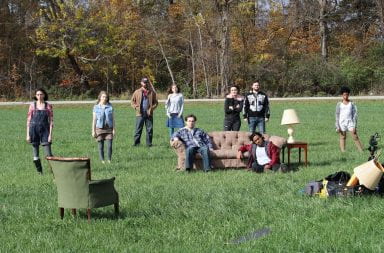The Ohio State Department of Theatre is planning to explore students’ and faculty members’ roles in the classroom in a forum-style production developed through a course called InterACT. Students have been working on this style of theater throughout the semester and will display their skills this weekend.
Forum theater was introduced by director Augusto Bowal in South America in the 1960s, said Elizabeth Wellman, a lecturer who has instructed the class at OSU since 2010. The audience has input as the characters improvise through a relevant social issue until they come to a solution.
Wellman described the InterACT class as a service-learning course. InterACT teaches improvisational skills and the tenets of forum theater in order to provide a cathartic experience for student audiences delving into the topic of belonging in the classroom.
“We aren’t presenting the answers, we are just asking the questions,” Wellman said. “We are asking, ‘Do I matter in the classroom, and how does that impact how I’m actually learning?’ and ‘How do we make a classroom that makes us feel like we belong?’”
Throughout the semester, the InterACT class is an intimate environment, typically consisting of about 10 students. Peers sit in a circle and connect with each other, their characters and the semester’s topic, as well as develop improvisational strategies before their final performances.
Topics explored have included suicide prevention, challenges of being an international student, prescription drug abuse and relationship abuse. WOSU Public Media partnered with InterACT for “The Generation Rx Initiative” video, which can be viewed on YouTube.
“The idea of having conversations about difficult topics breeds more vulnerability in the classroom. That freedom to say how you really feel creates a sense of community and friendship, and there is something cathartic about it,” said Ronda Christie, a first-year in theater who is in InterACT.
Students for InterACT are selected from the main-stage auditions through the Department of Theatre prior to each semester. Although the majority of class members are theater majors, InterACT is open to students in all areas of study.
Casting personnel actively look for students outside of the theater major with varying acting experience levels in order to create a diverse peer group to collaborate on the semester’s topics, Wellman said. The fall audition schedule will soon be posted on the InterACT Facebook page.
Building improvisational acting skills and obtaining intimate knowledge of the other students through group conversations are requirements for the course. Wellman tactfully facilitates these class discussions, creating a space where students share personal stories and attentively listen to one another.
“You have to be so in tune with your character that you can answers questions on their behalf. We have to get comfortable with each other and sharing our beliefs before the show, so it is authentic,” said Abigail Johnson, a second-year in theater and enrolled in InterACT.
The first of two 90-minute shows is on Saturday, and it addresses the topic of personal identity affecting the classroom experience. This includes race in the classroom and highlights conversations that can be difficult for teachers, Wellman said.
The second performance on April 30 addresses the topic of creating a sense of belonging in the classroom. This performance will develop ways to create educational environments that empower all students to practice meaningful participation in their courses.
The Spring Semester InterACT performances will be held in the Drake Performance and Event Center’s Ray Bowen Theater. Shows are set to begin at 7:30 p.m., and tickets are free, with seating available on a first-come first-served basis on the days of the performances.


